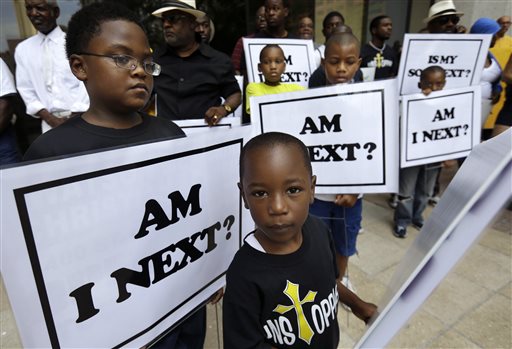Across US, people rally for ‘Justice for Trayvon’

Alvin Duplessis, 10, left, and Thomas McGriff, 5, foreground, hold signs with others from the Watson Memorial Teaching Ministries Church of New Orleans, at a rally held in reaction to the recent George Zimmerman acquittal in New Orleans, Saturday, July 20, 2013. The Rev. Al Sharpton’s National Action Network organized “Justice for Trayvon” rallies nationwide to press for federal civil rights charges against George Zimmerman, who was found not guilty in the shooting death of unarmed black teenager Trayvon Martin. (AP Photo/Gerald Herbert)
ATLANTA — Protesters gathered in cities from Los Angeles to New York to press for federal civil rights charges against the former neighborhood watch leader acquitted in the death of unarmed teen Trayvon Martin and to call for changes in the nation’s self-defense laws.
The Florida case has become a flashpoint in separate but converging national debates over self-defense, guns, and race relations. George Zimmerman, who successfully claimed that he was protecting himself when he shot Martin, identifies himself as Hispanic. Martin was black.
The National Action Network, led by the Rev. Al Sharpton, a prominent civil rights activist, organized the “Justice for Trayvon” rallies and vigils Saturday outside federal buildings in at least 101 cities. In Atlanta, where people stood in the rain at the bases of two federal buildings, with traffic blocked on surrounding downtown streets.
Chants rang out across the rallies. “Justice! Justice! Justice! … Now! Now! Now!” ”We won’t forget.” ”No justice! No peace!” Many also sang hymns, prayed and held hands.
And plenty of participants carried signs: “Who’s next?” “I am Trayvon Martin.” ”Enough Is Enough.”
Article continues after this advertisement“It’s personal,” said Cincinnati resident Chris Donegan, whose 11-year-old son wore a black hoodie to the rally, as Martin was wearing when he was fatally shot. “Anybody who is black with kids, Trayvon Martin became our son.”
Article continues after this advertisementZimmerman spotted Martin one night in February 2012 as teenager walked back from a convenience store in a gated Florida community. Believing Martin was acting suspiciously, the neighborhood watchman called police and then followed the youth on his own, armed with a handgun. He shot the 17-year-old Martin during an altercation.
Most rallies began at noontime. In New York, hundreds of people — including music superstars Jay-Z and Beyonce, as well as Martin’s mother, Sybrina Fulton — gathered in the heat.
Fulton told the crowd she was determined to fight for societal and legal changes needed to ensure that black youths are no longer viewed with suspicion because of their skin color.
“I promise you I’m going to work for your children as well,” she said to the rally crowd.
At a morning appearance at Sharpton’s headquarters in Harlem, she implored people to understand that the tragedy involved more than Martin alone. “Today it was my son. Tomorrow it might be yours,” she said.
In addition to pushing the Justice Department to investigate filing federal civil rights charges against Zimmerman, Sharpton told supporters he wants to see a rollback of stand-your-ground self-defense laws.
“We are trying to change laws so that this never, ever happens again,” Sharpton said.
Stand-your-ground laws are on the books in more than 20 states, and they go beyond many older, traditional self-defense statutes. In general, the laws eliminate a person’s duty to retreat in they fear death or bodily harm.
Zimmerman relied on a traditional self-defense argument, claiming that he shot Martin after the teen struck him.
He didn’t invoke stand-your-ground, though the judge included a provision about it in instructions allowing jurors to consider it as a legitimate defense. And race wasn’t discussed in front of the jury. But the two topics have dominated public discourse about the case, and came up throughout Saturday’s rallies.
Part of Sharpton’s comments echoed those made by President Barack Obama on Friday. “Racial profiling is not as bad as segregation, but you don’t know the humiliation of being followed in a department store,” Sharpton said.
Obama called on the nation to do some soul searching over the death of Martin and the acquittal of his shooter, saying the slain black teenager “could have been me 35 years ago.” Empathizing with the pain of many black Americans, Obama said the case conjured up a hard history of racial injustice “that doesn’t go away.”
In Indianapolis, the Rev. Jeffrey Johnson told about 200 attendees that the nationwide effort is about making life safer for young black men. He compared Zimmerman’s acquittal to that of four white Los Angeles police officers in the beating of black motorist Rodney King in 1992.
“The verdict freed George Zimmerman, but it condemned America more,” said Johnson, pastor of the Eastern Star Church in Indianapolis and a member of the board of directors of the National Action Network.
In Miami, Tracy Martin spoke about his son.
“This could be any one of our children,” he said. “Our mission now is to make sure that this doesn’t happen to your child.”
He recalled how he vowed to Trayvon as he lay in his casket that he would seek justice.
“I will continue to fight for Trayvon until the day I die,” he said.
Attorney General Eric Holder announced this week that his department would investigate whether Zimmerman could be charged under federal civil rights laws. Such a case would require evidence that Zimmerman harbored racial animosity against Martin. Most legal experts say that would be a difficult charge to bring. Zimmerman’s lawyers have said their client wasn’t driven by race, but by a desire to protect his neighborhood after a spate of burglaries.
Holder said the shooting demonstrates the need to re-examine stand-your-ground laws.